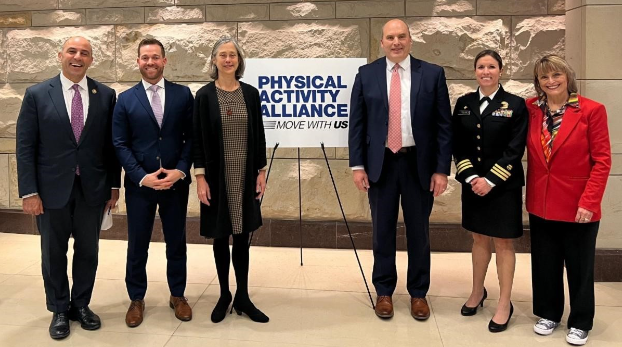|
March
18, 2024
Congressional Briefing with the Congressional Physical Activity Caucus

As part of its membership with the Physical Activity Alliance (PAA), ACSM recently participated in a Congressional Briefing supported by the Congressional Physical Activity Caucus. The briefing was put together to discuss the importance of prioritizing physical activity and to promote soon to be introduced omnibus physical activity legislation.
Congressional Physical Activity Caucus Co-Chair Representative Jimmy Panetta [D-CA]
Dr. Ruth Petersen, MD, MPH, CDC Director Division of Nutrition, Physical Activity, and Obesity (DNPAO).
Dr. Katrina Piercy Katrina L. Piercy, PhD, RD, ACSM-CEP, FACSM; CDR, U.S. Public Health Service; Director, Division of Prevention Science Office of Disease Prevention and Health Promotion
Monte Ward, ACSM Government Relations
Vicki Shepard, MPA, ACSW; Tivity Health Vice President, Government and Industry Relations
Mike Goscinski, The Health & Fitness Association
President Biden’s 2025 Proposed Budget
On March 11, 2024, the Biden Administration released its proposed budget for fiscal year (FY) 2025. The budget proposes significant investments across various healthcare sectors, intended to build on previous successes and aimed at addressing pressing challenges. Key highlights include expanding coverage and lowering healthcare costs through initiatives such as extending Marketplace affordability and capping the cost of insulin products, strengthening maternal and reproductive health outcomes with increased funding for programs addressing maternal mortality and health equity, and transforming behavioral healthcare with substantial investments to expand access to mental health and substance use disorder services. Other initiatives include the following:
- Expand Coverage and Lower Healthcare Costs:
- Extension of Marketplace affordability and capping insulin costs at $35 per month.
- Expansion of Medicare's ability to negotiate drug prices.
- Permanent extension of enhanced premium tax credits.
- Provision of Medicaid-like coverage for low-income individuals.
- Extension of consumer surprise billing protections to ground ambulances.
- Strengthen Maternal and Reproductive Health Outcomes:
- Increase in funding for Title X family planning program.
- Allocation of $376 million for programs addressing maternal mortality and health equity.
- Transform Behavioral Healthcare:
- $20.8 billion investment in behavioral health.
- Dedication of $602 million to the 9-8-8 suicide and crisis lifeline.
- Expansion of coverage for behavioral health services.
- Advance Science to Improve Health:
- $2.9 billion investment in the Cancer Moonshot initiative.
- Increase of $100 million for CDC to fund cancer prevention and control programs.
The HHS Budget in Brief is available here. A Fact Sheet on the budget is available here.
Grant Management and Policy Updates
To assist the research community in preparing for grant management and policy updates, the National Institutes of Health (NIH) and the National Science Foundation (NSF) recently conducted individual webinars. These sessions aimed to clarify agency expectations and provide updates on programs and policies.
On January 31, compliance and system policy experts from the NIH Office of Policy for Extramural Research Administration (OPERA) delivered the latest policy updates and discussed potential impacts on researchers' institutions. OPERA officers offered guidance on grants process requirements, application deadlines and forms, covering various initiatives such as the Small Business Innovation Research (SBIR) and Small Business Technology Transfer Research (STTR) Extension Act of 2022, as well as the NIH Peer Review – Simplified Review Framework. They shared resources on application submission, eRA Commons ID, Research Performance Progress Reports (RPPRs) and grant closeout requirements. Participants also had the opportunity to ask questions about new and existing policies during the live Q&A session. For further insights, the recorded webinar is available on YouTube, along with presentation slides, providing a deeper understanding of NIH's research priorities, funding opportunities, and the grant application process.
The Division of Molecular and Cellular Biosciences (MCB) at NSF hosted a virtual office hour on February 14 focusing on grant management, specifically on Working with an NSF Program Working with an NSF Program Director Before, During, and After Award. Program directors (PDs) play a crucial role in maintaining an effective proposal merit review process and serve as advisors to applicants and awardees, streamlining NSF program objectives, priorities, and requirements. During the presentation, PDs provided guidance on when to connect with them and considerations before contacting a PD regarding NSF review criteria and processes. They offered detailed instructions on an email template for queries and how to craft an effective one-page project summary, outlining research ideas and broader impact interests, along with pointers to avoid. The session also covered post-award procedures, including possible budget revisions, annual reporting, and sharing publications. FAQs addressed definitions of Categories of Personnel, Accomplishment-Based Renewal and information on CAREER grant. The recording and slides are available here. For alerts on future virtual office hours, interested individuals can subscribe to the MCB Blog.
The White House Announces New Partnership with Major Sports Leagues and Players Associations to Boost Physical Activity and Increase Nutrition Programming Across the Country.
Click here to find out more about the agreement.